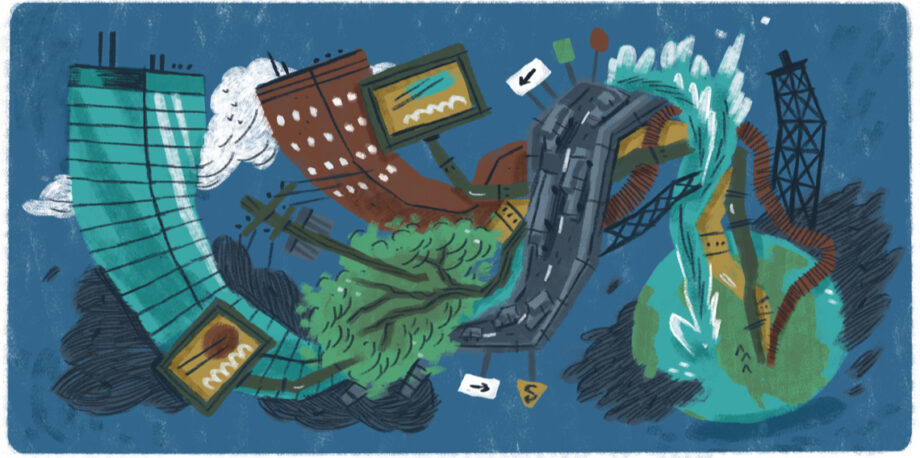July 8, 2014 — The time has come for us to collectively reexamine — and ultimately move past — the concept of sustainability. The continued invocation of sustainability in policy discussions ignores the emerging realities of the Anthropocene, which is creating a world characterized by extreme complexity, radical uncertainty and unprecedented change. From a policy perspective, we must face the impossibility of even defining — let alone pursuing — a goal of “sustainability” in such a world. It’s not that sustainability is a bad idea. The question is whether the concept of sustainability is still useful as an environmental governance framework.
In general, “sustainability” refers to the long-term ability to continue to engage in a particular activity. “Sustainable development” reflects a broader goal about how development should proceed — namely, with sufficient consideration of the environment to ensure the continued availability of natural capital. The international community embraced sustainable development at the 1992 United Nations Conference on Environment and Development in Rio de Janeiro, incorporating it into both the Rio Declaration and Agenda 21.
Policy discussions remain framed by the goal of sustainability, ignoring the fact that the concept has failed to meaningfully change human behavior.The idea of sustainable development developed in an era of emerging concern about climate change. The pursuit of sustainable development goals, however, has not resulted in either sustainability or effective mitigation of climate change. Greenhouse gas emissions and resource consumption patterns have continued to increase. In anticipation of Rio+20, the U.N. Environment Programme released a report concluding that as human pressures on the planet accelerate, critical global, regional and local thresholds are quickly being approached or, in some cases, have already been exceeded.
Despite this alarming and unpredictable situation, policy discussions remain framed by the goal of sustainability, ignoring the fact that the concept has failed to meaningfully change human behavior.
By definition, sustainability assumes that there are desirable states of being for social-ecological systems, or SESs, that humans can maintain indefinitely. In practice, sustainability goals proved difficult to achieve in many SESs even before climate change impacts became noticeable. With climate change, we face a future in which we have no idea what we can sustain. Therefore, we must begin to formulate environmental governance goals by some metric other than sustainability.
Shifting the governance focus from sustainability to resilience is not admitting defeat. It re-orients us to focus on coping with change.The concept of resilience holds promise as a new way of addressing the challenges ahead. While not inherently incompatible concepts, resilience and sustainability are not the same. The pursuit of sustainability assumes that we a) know what can be sustained and b) have the capacity to maintain stationarity (i.e., keep the system operating within an unchanging envelope of variability). In contrast, resilience thinking acknowledges disequilibrium and nonlinear, continual change — often as a result of crossing a “tipping point” or threshold — and offers a tool for assessing the dynamic relationships between systems, which is a facet of SESs that will become increasingly important given current rates of globalization and increasingly complex socio-ecological challenges. It also has the potential to be more helpful than sustainability when examining social justice and other human development concerns because it requires an assessment of not only what we value but also the extent to which those values are reflected in our policies and approaches.
Shifting the governance focus from sustainability to resilience is not admitting defeat. It reorients us to focus on coping with change. Research to develop baseline data is still important —not as a guide for what we can “sustain,” but instead to identify tipping points that might provide insight into future systems change and help to identify critical ecological thresholds.
Unfortunately, while the concept of resilience is gaining the attention of natural resource managers and policy makers, it is already in danger of becoming — like sustainability — a rhetorical device with little influence on actual decision making. Adaptive governance and adaptive management offer promise in terms of putting these ideas into practice but, to date, they have not yet been integrated into legal and regulatory frameworks in enforceable ways.
What we need are new policies and institutions that accommodate uncertainty and anticipate nonlinear change, both of which are realities of the Anthropocene. Scientists, policy makers and others must work together to design and implement environmental policies that promote and build adaptive capacity while also providing stronger, more legally enforceable and institutionally supported goals — goals that reflect the adaptation strategies necessary to negotiate our complex and rapidly changing world. ![]()
This is an abbreviated version of “The End of Sustainability,” an article published by Taylor & Francis Group in Society & Natural Resources: An International Journal on 07/05/2014.
Editor’s note: The views expressed here are those of the author and not necessarily of Ensia. We present them to further discussion around important topics. We encourage you to respond with a comment below, following our commenting guidelines, which can be found here. In addition, you might consider submitting a Voices piece of your own. See Ensia’s “Contact” page for submission guidelines.
Ensia shares solutions-focused stories free of charge through our online magazine and partner media. That means audiences around the world have ready access to stories that can — and do — help them shape a better future. If you value our work, please show your support today.
Yes, I'll support Ensia!


When engaging within landscape projects I start with a governance compass. It illustrates where I am in relation to other governance sectors. Without this compass, all wander somewhat aimlessly within and around their sector silos.
To abandon that, and the goals, methodology, indices and effort for an embrace of an 'Anthropocene' of unknown dystopic dimension is rank foolishness. It is to forget that the world has always been in motion, and that all species and geologic processes have made their own impacts over time. To observe that large scale programs to date have have varied success, and often fall short of targets, is not a justification to abandon those efforts.
You correctly observe that human behavior is resistant to change. So is human nature. Our efforts might be better rewarded if we can find methods that utilize our natural proclivities in efforts that do not further degrade the fitness of the world to provide for humans and other species. Our survival instincts focus each of us on our daily survival and satisfaction, while our science observes that this is leading to current and future disaster. I believe that with sufficient investigation and effort, we can harness and direct our survival instincts, to arrest and repair environmental degradation, in ways that provide for our immediate satisfaction as well as our long term security.
As Jon says "Resilience is already contained within Sustainability, which is not meant to be rigid or unchanging."
It's not that sustainability, as a concept, has failed. There's never been a serious global attempt to implement sustainability. That's the change we need. Abandoning the attempt would have even more disastrous consequences for humanity's future.
We are in the early stages of adding an ecological dimension to the economy - we are in the process of "negotiating sustainability". That process will involve integrating the realities of Smith's Invisible Hand, Hardin's Tragedy of the Commons and Ostrom's Shared Governance.
EcoCommerce 101 www.ecocommerce101.com describes in broad and detailed manner how this transaction will take place within the agro-enviro economy. It recognizes that we can not escape the principles as described by these individuals, but must embrace each one.
Sustainability has the conservative flavor of maintaining Earth's life-support systems for future generations via policies that are acceptable for democratic societies and economically feasible. Yes, it is not the fastest coping strategy.
In addition, sustainability remains a concept as fuzzy as "justice" or "freedom" or "peace". But finally, who argues that we should abandon such goals just because they are a bit tricky to transform into successful policies?
Second, it's incorrect that the pursuit of sustainable development "has not resulted in either sustainability or effective mitigation of climate change". If we take a 50,000 ft look and generalize the impacts, it's very easy to say that negative climate change impacts continue to occur and haven't been mitigated. That's simply untrue. Major strides have been made in renewable energy, ecosystem management, and the built environment (LEED, Green Globes, ENVISION, etc.). These are just a few of many items that fall under the sustainability umbrella that have had positive impacts on communities and the environment.
I believe the disconnect lies in our propensity to accentuate the negative as opposed to highlighting the positive. The notion of the death of sustainability as stated in this piece seems to focus on conditions worsening overall. But our human contribution to this negative impact keeps increasing. Coal plants continue to operate. More cars continue to hit the roads. Deforestation is still present. It does prove to be a hard argument to justify sustainability when weighed against these things that don't seem to be slowing anytime soon. But, l'd challenge the authors to collect data on the positive impacts of sustainability and sustainable development.
Resilience just seems as if we're bracing for an inevitable negative consequence and we're preparing to be "at the ready" if such an event occurs. Resilience falls under the sustainability umbrella in my opinion, and it's necessary to have resilience frameworks. But, I don't think it suffices as a stand-alone or a replacement paradigm. Policies to promote adaptive capacity won't be effective until we embrace and address our role in promoting destructive capacity. I agree that the world is rapidly changing, but we need to acknowledge that we're the ones changing it. Sustainability guides us to a place and points us toward making that change positive and restorative.
Mankind has arrogantly determined this planet is ours for the taking, simply because we can. So much for higher intelligence. Higher intelligence recognizes the absolute necessity of biodiversity and ecological balance.
We have failed to recognize the simple fact that anything less than 100% sustainability is unsustainable. Anything less than 100% resilient is not resilience. Until we recognize our planet's limited capacity to support life neither approach, separately or in combination, will prevent ecological collapse.
The hard truth is that the human race must begin to truly sacrifice our desires, not our needs, if this planet's natural ecological balance is ever to return. Reducing consumption to a more profound degree than most care to imagine is essential to acheive sustainability and resilience. Our new mantra should be sacrifice... not sustainability or resilience. Nothing is sustainable or resilient when resources are depleted or contaminated to toxic levels.
I appreciated the highlights of the abbreviated article and the follow-up comments. I believe strongly that we have to simultaneously embrace sustainability and resiliency. Sustainability involves recognizing limits to the global ecological system within which we have to operate or long-term, we are toast. True, there's a lot of work to be done as we try and define those limits and design the retrofits of existing environments and new infrastructure to operate within them. That's how we get after addressing problems through mitigation strategies; for example carbon management and climate change. Along this line, what has happened to discussions of human populations within the context of global limits, as was always on the environmental agenda in the early 1970's? It is more daunting as a fundamental driver of environmental degradation now than ever!
Resiliency or adaptation has to be embraced as well as we prepare for the unavoidable consequences of change; human-induced or otherwise. A couple of years back as I watched news reports on Hurricane Sandy, it was eerie how prophetic a video was that I had seen at the U.N. Climate Conference in Copenhagen in 2009 on the vulnerability of the world's low-lying cities. Wow!
We must remind ourselves though that adaptation largely addresses symptoms while mitigation addresses causes. Personally, I try and do all I can on various fronts while striving to be hopeful and impart that approach to my students. Without hope, all is lost. I have the Serenity Prayer posted in my offices.
Incidentally, this college professor was out weeding his carrots before I fired up my computer and read all of this.
I guess I did not understand your statement. Certainly no offense intended. My comment was in support of your statement, or so I intended.
I've noticed over the last 12+months a growing number of "cases" being put forward regarding the death of sustainability and/or the need to re-position ourselves via the terminology we use. Which in my opinion amounts to shuffling the deckchairs on the Titanic and completely misses the point.
Sustainability as a concept, approach, philosophy or whatever you want to categorise it as, is still the most valid, depending on how any one individual or entity (private or public) defines it. Thus the problem as far as the achievements to date falling below expectations/needs, is not in the concept (or, as this article and many others allude, the phrase itself), but in it's ineffective application.
Put simply, "sustainability" hasn't failed, it's society (govt, institutions, business, and private individuals) that has failed to fully understand it and embed it. The approach is still the most valid (and comprehensive), it's human behaviour that has let us down so far.
The problem has been so much focus on the "human use" of natural systems to satisfy "human needs" without paying much attention the limits of the natural system. Many governments and even local natural resource users at the grassroots have ignored the reality of the limits for the sake of economic gains....
Further complicating things, especially from a practical point of view, is a “resilience agenda” at large in the American conversation that seems to be about one part disaster risk reduction and climate adaptation, and one part whatever you want it to be - interpreted in diverse ways by entities from the Dept. of Homeland Security to Transition Towns. So far, I haven’t seen anything from this jumbled space that isn’t already contained in better developed frameworks for sustainable development, disaster risk reduction, and climate mitigation and adaptation. Scholarly debates are one thing, and the critical academic literature on resilience is quite interesting, but changing labels at this critical juncture seems to me mostly like a dangerous diversion.
Further complicating things, especially from a practical point of view, is a “resilience agenda” at large in the American conversation that seems to be one part disaster risk reduction and climate adaptation, and one part whatever you want it to be - interpreted in diverse ways by entities from the Dept. of Homeland Security to Transition Towns. So far, I haven’t seen anything from this jumbled space that isn’t already contained in better developed frameworks for sustainable development, disaster risk reduction, and climate mitigation and adaptation. Scholarly debates are one thing, and the critical academic literature on resilience is quite interesting, but changing labels at this critical juncture seems to me mostly like a dangerous diversion.
I also think that either/or debates are not as useful as creating a spectrum of actions. Sustainability, Resilience, and Regeneration are a continuum of human activity. Each one builds the others.